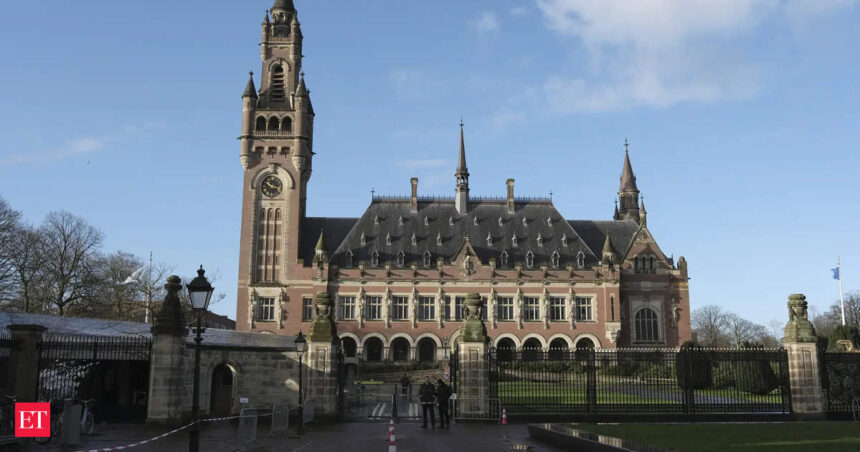The International Court of Justice said in a non-binding opinion issued there that Israel has abused its status as the occupying authority in the West Bank and East Jerusalem by carrying out the policy of annexing territories, imposing permanent control and building settlements.
He said the move made “Israel’s presence in the occupied Palestinian territories illegal.” He said their continued existence was “illegal” and should end “immediately.”
The President of the International Court of Justice, Nawaf Salam, is expected to spend about an hour reading the full opinion of the panel, which is made up of 15 judges from around the world.
In part of the opinion, said the panel has found that “the transfer by Israel of settlers to the West Bank and Jerusalem as well as the maintenance of Israel’s presence, is contrary to article 49 of the Fourth Geneva Convention.” The court also noted with “deep concern” that Israel’s settlement policy has escalated.
The court also found that Israel’s use of natural resources was “inconsistent” with its obligations under international law as an occupying power. The hearing comes against the backdrop of Israel’s 10-month military offensive in Gaza, which was triggered by a Hamas-led offensive in southern Israel. In a separate case, the International Court of Justice is considering South Africa’s claim that Israel’s campaign in Gaza amounts to genocide, a claim that Israel vehemently denies. Israel captured the West Bank, east Jerusalem and the Gaza Strip during the Middle East war of 1967. The Palestinians seek all three territories for an independent state.
Israel considers the West Bank a disputed territory, whose future must be decided in negotiations, while it has moved its population into settlements to strengthen its hold. It has annexed east Jerusalem in a move not recognized internationally, when it withdrew from Gaza in 2005 but maintained a blockade of the area after Hamas took power in 2007. The international community generally considers all three areas to be occupied territory.
In a hearing in February, then-Palestinian Foreign Minister Riad Malki accused Israel of apartheid and urged the United Nations’ top court to declare that Israel’s occupation of the land sought by the Palestinians is illegal and must end immediately and unconditionally for the hope of two- future state for life.
Israel, which usually views the UN and international courts as unfair and biased, did not send a legal team to the hearing. But submitted a written comment, saying that the question put to the court prejudiced and “failed to recognize the rights of Israel and the duty to protect its citizens,” address the security issues of Israel or recognize the Israeli-Palestinian agreement to discuss issues, including “permanent status. territories, security arrangements , settlements, and borders.”
The Palestinians staged a protest in February along with 49 other countries and three international organizations.
Erwin van Veen, a senior researcher at the Clingendael think tank in The Hague, said that if the court rules that Israel’s policies in the West Bank and east Jerusalem violate international law, it will not change Israeli policy but will “isolate Israel.” more international, at least from a legal point of view.”
He said the decision would “shortcut the occupation case. It removes all legal, political, philosophical foundations from Israel’s expansion project.”
It will also strengthen the hands of “advocates” – such as the Palestinian-led movement that supports boycott, divestment and sanctions against Israel.
He said it could also increase the number of countries recognizing the Palestinian state, especially in the Western world, with recent examples in Spain and Norway and Ireland.
This is not the first time the ICJ has been asked to give a legal opinion on Israeli policy. Two decades ago, the court ruled that Israel’s West Bank separation barrier was “contrary to international law.” Israel boycotted the process, saying it was politically motivated.
Israel says the barrier is a security measure. Palestinians say the structures are a massive land grab because they often dip into the West Bank.
The UN General Assembly voted by a wide margin in December 2022 to ask the world court to advise. Israel strongly opposes the request presented by the Palestinians. Fifty countries abstained from voting.
Israel has built more than 100 settlements, according to the anti-settlement watchdog group Peace Now. The West Bank settler population has grown by more than 15% in the past five years to more than 500,000 Israelis, according to pro-settler groups.
Israel has also captured east Jerusalem and considers the entire city as its capital. An additional 200,000 Israelis live in settlements built in east Jerusalem that Israel considers a neighborhood of the capital. Palestinians in the city face systematic discrimination, making it difficult to build new homes or expand existing homes.
The international community considers all settlements illegal or an obstacle to peace because they are built on land sought by the Palestinians for their state.
Prime Minister Benjamin Netanyahu’s hardline government is dominated by settlers and their political supporters. Netanyahu has given the finance minister, Bezalel Smotrich, a former settler leader, unprecedented authority over settlement policy. Smotrich has used this position to strengthen Israeli control over the West Bank by continuing plans to build more settlement houses and legalize outposts.
The authorities recently approved the appropriation of 12.7 square kilometers (almost 5 square miles) of land in the Jordan Valley, a strategic piece of deep land in the West Bank, according to a copy of the order obtained by The Associated Press. Data from Peace Now, a tracking group, show that this is the largest single appropriation approved since the 1993 Oslo accords at the start of the peace process.




